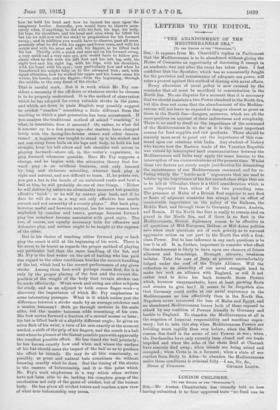LETTERS TO THE EDITOR.
"TEE ABANDONMENT OF THE MEDITERRANEAN SEA."
[To THE EDITOR OP THE "SPECTATOR."] SIE,—It appears from Mr. Churchill's replies in Parliament that the Mediterranean is to be abandoned without giving the House of Commons an opportunity of discussing it except in an academic way and after the event has taken place. I feel confident that the Spectator, which has so consistently fought for the provision and maintenance of adequate sea power, will enter a protest against this method of dealing with naval affairs.
Every alteration of naval policy is now excused by the reminder that all must be sacrificed to concentration in the North Sea. No one disputes for a moment that it is necessary that we should maintain a two-Power standard in the North Sea, but this does not mean that the abandonment of the Mediter- ranean will not leave us exposed to dangers almost as great as, those in the North Sea—dangers, moreover, which are all the more perilous on account of their indirectness and complexity. There is no need to dwell on the importance of the command of the Mediterranean in so far as it is the most important avenue for food supplies and raw products. There should be scarcely more need to point out the importance of this com- mand upon our relations with India. Any student of history who knows how the Eastern trade of the Venetian Republic was ruined by interrupted land communications between the Mediterranean and India may apply the same lessons to the interruption of sea communications at the present time. Whilst these two factors are surely ample justification for demanding the maintenance of our Mediterranean command, and for re- fusing utterly the " bottle-neck " arguments that are used to bolster up the importance of the few second-class ships that are to be left at Gibraltar, there is a third consideration which is more important than either of the two preceding ones. The presence at Malta of a British fleet superior to any fleet or fleets of adjacent countries has always had an effect of incalculable importance on the policy of the Balkans, the Middle East, and through these to Germany, Franco, Austria, and Russia. If the North Sea fleet is really to remain tied on guard in the North Sea, and if there is no fleet in the Mediterranean, British diplomacy ceases to be effective in all questions of Mid-European, Balkan, or Mid-Asian politics save when such questions are of such gravity as to warrant aggressive action on our part in the North Sea with a first- class Power. But to lose influence in any such questions is to lose it in all. It is, further, important to consider what effect the abandonment is likely to have upon our chances of future alliances and friendships. Strength attracts ; weakness isolates. Take the case of Italy, at present uncomfortably lodged under the roof of the Triple Alliance. Will the reduction to an absurdity of our naval strength tend to make her seek an alliance with England, or will it not rather tend to drive her back towards those Powers which, however unsympathetic, have at least growing fleets and armies to give her P It seems to be forgotten also that Germany could strike at our naval supremacy in the. Mediterranean no less effectively than in the North Sea. Napoleon never recovered the loss of Malta and Egypt, and an abandoned Mediterranean leaves, both .of these exposed to attack by any coalition of Powers friendly to Germany and hostile to England. To abandon the Mediterranean at all is the negation of Imperial responsibility and maritime supre- macy; but to take this step when Mediterranean Powers are building more rapidly than over before ; when the Mediter- ranean Sea itself is the scene of two Powers at war ; when , the Dardanelles have only recently been closed and our trade impeded and when the echo of the shots fired at Charnak have scarcely died away ; when islands are being seized and occupied ; when Crete is in a ferment; when a state of war reaches from Sicily to Aden—to abandon the Mediterranean under these conditions is criminal folly.—I am, Sir, Ste.,






















































 Previous page
Previous page